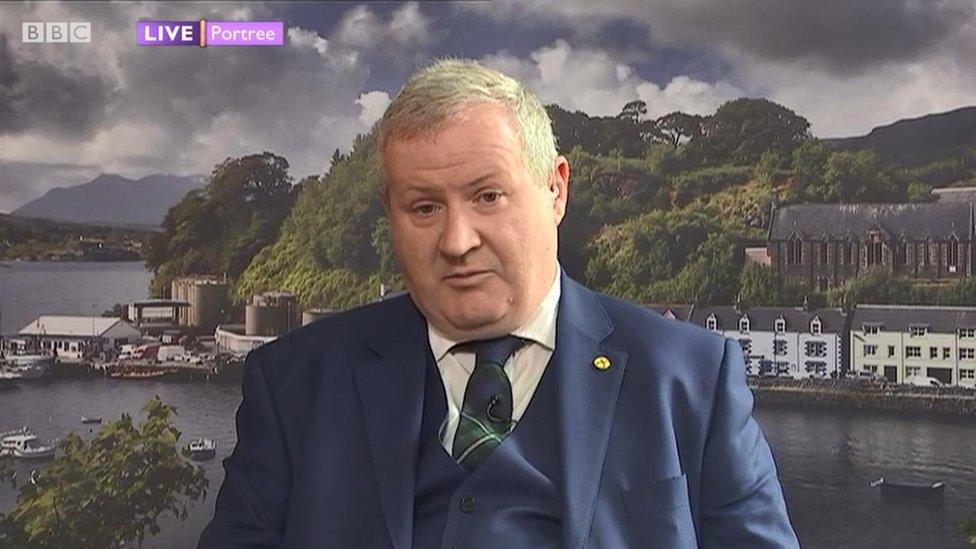Are Joanna Cherry's claims of SNP 'infighting' true?
- Published
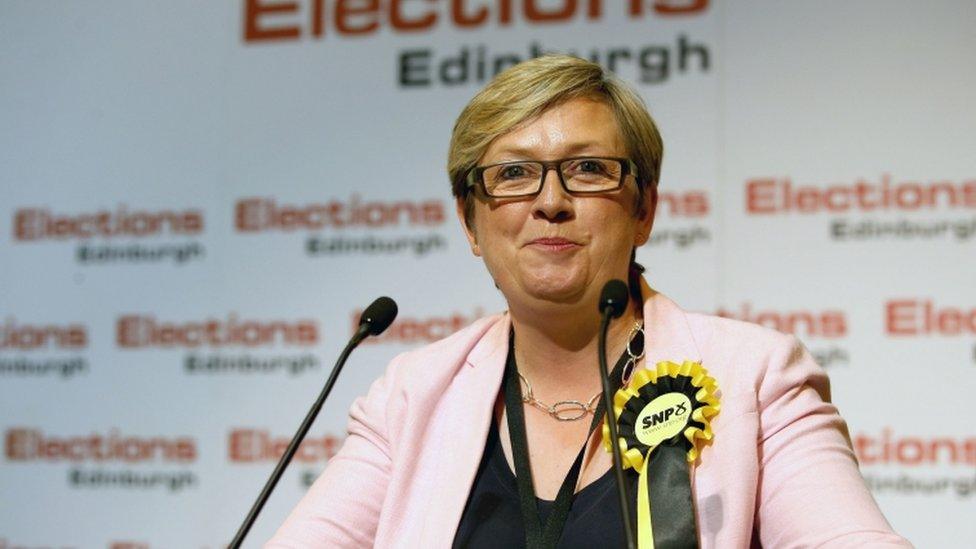
An SNP MP has hit out at party "infighting" after claims of "back-stabbing" and "politically motivated smears". What is the Joanna Cherry row all about, and what are the wider issues for the party?

What's the background?
The current row stems from complaints from a number of former members of Ms Cherry's staff.
One former caseworker wrote in the Sunday Herald, external about complaints of bullying against the Edinburgh South West MP and her office manager.
Another former employee said that "almost all her staff" had written letters of complaint to Commons authorities over their treatment.
Ms Cherry rejects these accusations, describing them as "lies", external and "spurious", saying that "I am not and never have been a bully".
On the one hand, this could be seen as a matter of office dispute resolution. But on the other, it's politics. Ms Cherry has certainly chosen to cast it that way, talking about "politically motivated smears", which she says "arise from SNP infighting, external".
She has retweeted and "liked" messages from supporters online which use a hashtag reading "I stand with Joanna". And then on Wednesday, she tweeted that "at least the Conservatives do their back-stabbing in public".
So what is this "infighting" all about?

Equal rights
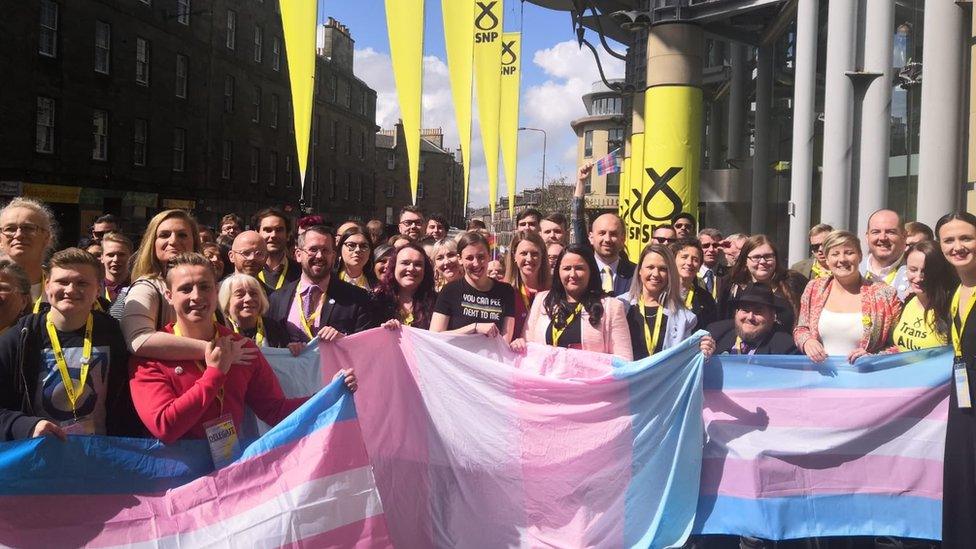
Trans activists and campaigners from within the SNP joined together with MPs and MSPs at party conference
There is a simmering row within the SNP about trans rights and gender identity.
In fairness, this isn't just an issue for one political party - it's something that affects the whole of society. But it currently seems to be gripping the SNP more than others, possibly by dint of the party's position in government in Scotland.
The Scottish government is planning reforms to the Gender Recognition Act (GRA) to allow people to "self-declare" their legally recognised gender.
Some ministers see the current system - which requires transgender people to produce medical reports and satisfy a panel that they have gender dysphoria - as intrusive and outdated.
But others are urging caution. A group of 15 SNP politicians - including several junior ministers, and MPs including Ms Cherry - signed a joint letter urging the government not to "rush" into "changing the definition of male and female".
They are concerned about the potential implications for women - in contrast with First Minister Nicola Sturgeon, who has declared that transgender rights are "not a threat to me as a woman".
This is an intensely divisive issue. For example, look at the Dundee councillor who quit the SNP complaining of "institutional transphobia" - who was also suspended from the council for two months over "offensive" and "abusive" tweets on the topic.
Ms Cherry has not been right at the forefront of the debate - certainly not to the extent of, say, MSP Joan McAlpine - tweeting, external at one point that "where there are competing interests there must be civilised and open debate".
But by signing the GRA letter she was seen to have picked a side, and she also got into a row with activists over claims she "misgendered" someone on Twitter.
It was the MP's complaints of being abused, external on social media which led to the Sunday Herald article, with the employee involved saying that they "couldn't stay silent anymore" when they saw the "hypocritical" posts.

The road to independence
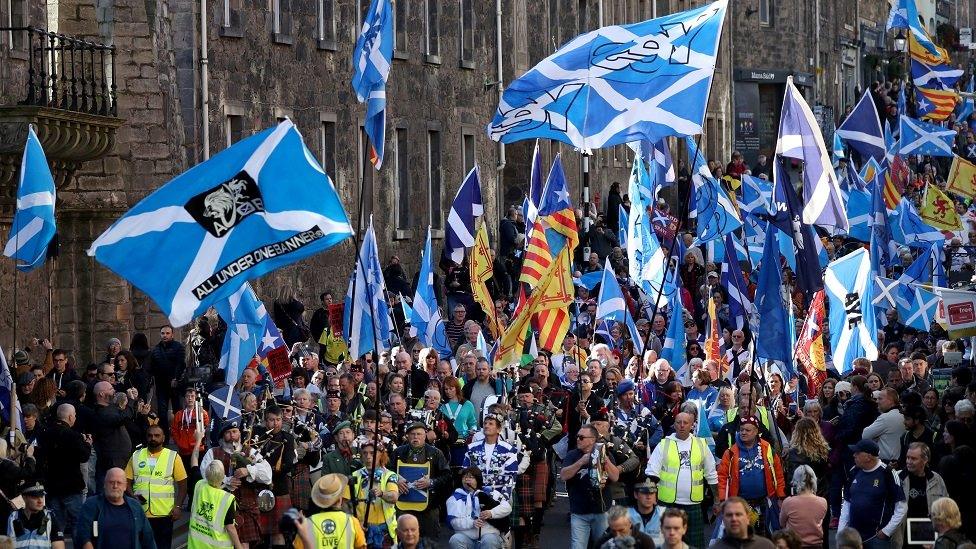
It won't be a surprise to anyone that SNP activists enjoy debating independence.
First Minister Nicola Sturgeon and her team have a plan: they want to have a new referendum before the end of the current Holyrood term, subject to an agreement with the UK government.
They have drawn up an economic blueprint, the "growth commission", and set up a new campaigning strategy complete with social media hashtag.
The leadership's approach is, broadly, accepted - but it is not the only one within the party.
Some members want to go faster. Some MPs and party executive members, straining at the leash, have called for a new referendum within the year.
There are also divisions over the economic plan, which were underlined at the most recent SNP conference when Ms Sturgeon was defeated over an amendment to currency proposals. It was a minor rebuke, but a rebuke nonetheless.
Ms Cherry is among those who have suggested alternative approaches. At another party conference, in October 2018, she suggested that "it doesn't have to necessarily be a referendum" that would trigger independence. She also criticised the "softly softly" approach of the growth commission.
In calling for "an end to SNP infighting", the MP specifically linked the issue to independence, saying: "The timetable for indyref2 has been announced, our restiveness is at an end, with unity and civility we will win."

Leadership ambitions
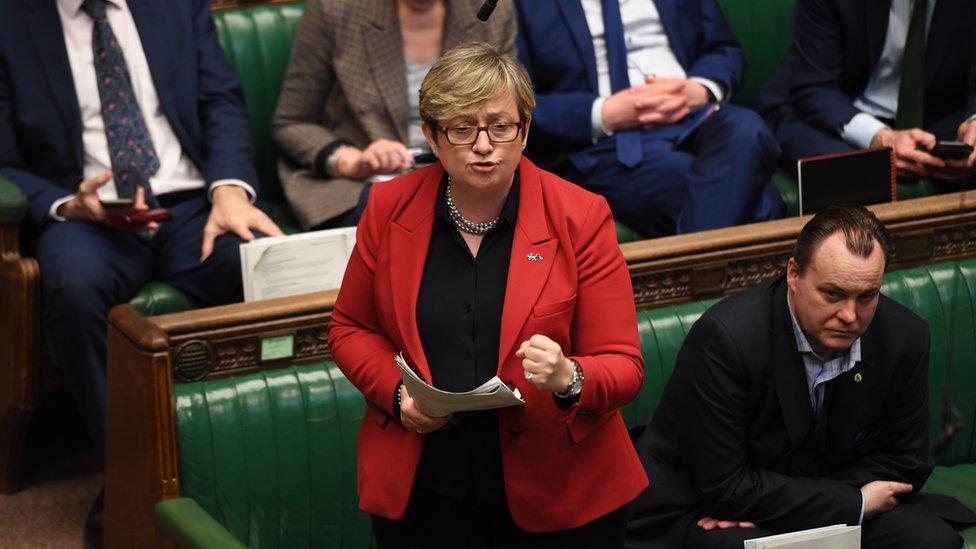
Ms Cherry stood for the leadership of the SNP's Westminster group
The other way the row has been cast is as evidence of Ms Cherry's apparent leadership ambitions.
The MP "liked" a post on Twitter by the journalist Kenny Farquharson, where he linked to a piece speculating about Ms Sturgeon's departure, external from office and Ms Cherry's prospects of succeeding her.
So, is this really all about the top job in the SNP?
For a long time, Ms Sturgeon's position has been unassailable. And to be clear, it is still secure - far more so than that of almost any other political leader in the UK.
But the fact is, people are now talking - both behind closed doors and more openly - about life after her leadership. She has been asked about it in the Holyrood chamber and in national TV interviews - making it clear each time that she's not planning on going anywhere.
Allow X content?
This article contains content provided by X. We ask for your permission before anything is loaded, as they may be using cookies and other technologies. You may want to read X’s cookie policy, external and privacy policy, external before accepting. To view this content choose ‘accept and continue’.
As for Ms Cherry, the fact she would rather Scotland were independent aside, her Edinburgh South West seat is at risk of being abolished at the next election after a Westminster boundary review. She has been tipped as a potential challenger to Scottish Tory leader Ruth Davidson in Edinburgh Central, so a move to Holyrood could well be in the offing.
She certainly has ambitions, having previously been a candidate to lead the Westminster group.
And in each of the potential schisms facing the party, listed above, it seems like Ms Cherry is on the opposite side from Ms Sturgeon. On the urgency of holding indyref2 as quickly as possible. On the currency plan. On trans rights.
Is this a case of reading too much into minor differences? Perhaps. Maybe it really is just a matter of office politics, rather than national politics.
But Ms Cherry is the one fuelling the talk of "back-stabbing" and "infighting", which is why scrutiny like this persists.
The whole row has chiefly been interesting because of how unusual it is. The SNP has been an incredibly tight unit in recent years, resisting rebellions even as fractures tear through the other mainstream parties.
But like the other mainstream parties, the SNP is a big tent. In particular since its surge in membership after the 2014 referendum, the party includes many passionate people with quite different, strongly-held views, united by the overarching cause of independence.
In a big political movement like this, splits are fairly inevitable. The real test is how they are dealt with and managed.


- Published12 May 2019
